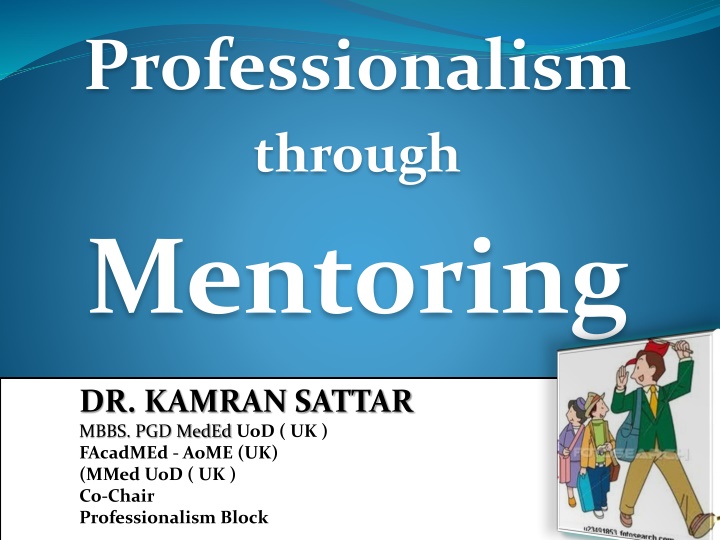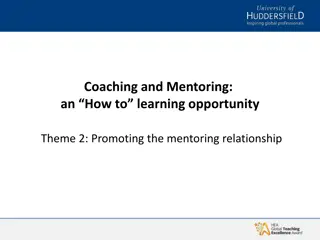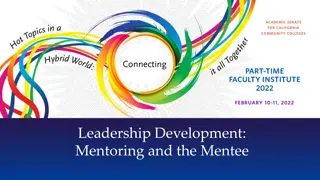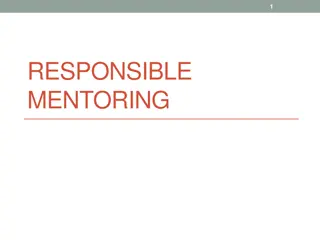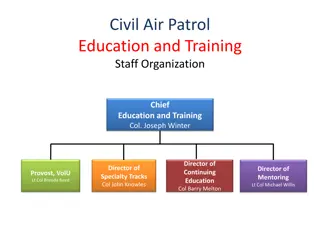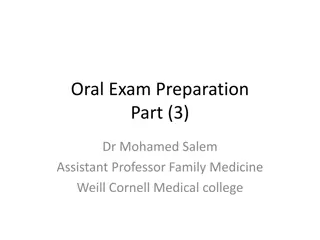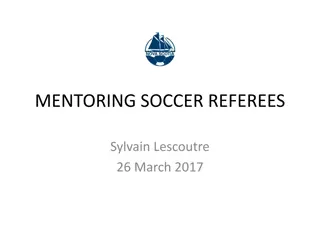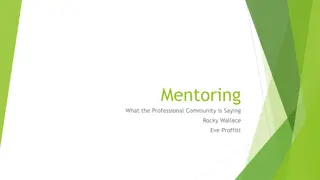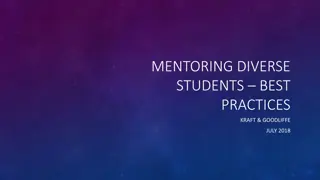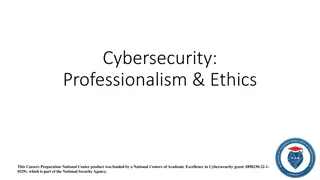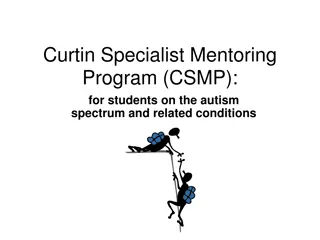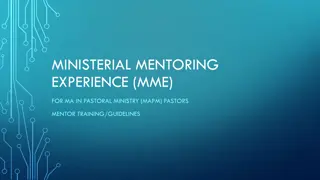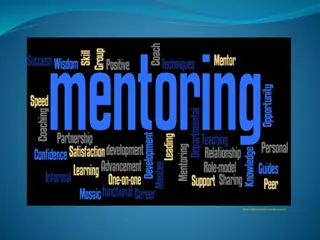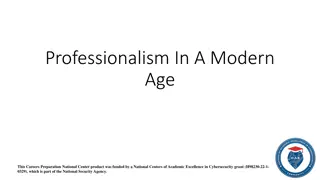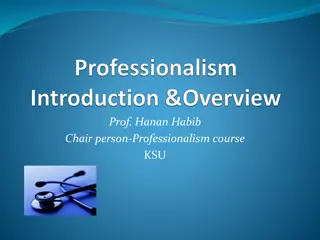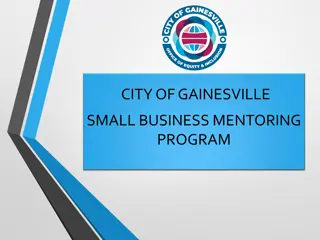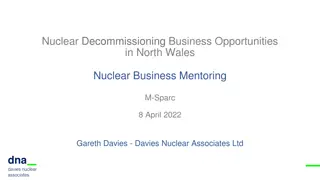Professionalism Through Mentoring: A Comprehensive Overview
The concept of mentoring, roles of mentor and mentee, expectations from mentoring, and importance of effective mentorship in career success are highlighted in this insightful presentation. Mentoring is portrayed as a professional relationship intended to enhance individuals' training within an organization. It emphasizes supporting individuals to manage their own learning for personal growth and skill development. The content stresses the importance of varied mentoring styles, tailored to different levels of students and mentors, in fostering successful mentorship relationships. Mentoring is depicted as a collaborative process involving mentorship, guidance, and mutual learning.
Uploaded on Feb 18, 2025 | 5 Views
Download Presentation

Please find below an Image/Link to download the presentation.
The content on the website is provided AS IS for your information and personal use only. It may not be sold, licensed, or shared on other websites without obtaining consent from the author.If you encounter any issues during the download, it is possible that the publisher has removed the file from their server.
You are allowed to download the files provided on this website for personal or commercial use, subject to the condition that they are used lawfully. All files are the property of their respective owners.
The content on the website is provided AS IS for your information and personal use only. It may not be sold, licensed, or shared on other websites without obtaining consent from the author.
E N D
Presentation Transcript
Professionalism through Mentoring DR. KAMRAN SATTAR MBBS. PGD MedEd UoD ( UK ) FAcadMEd - AoME (UK) (MMed UoD ( UK ) Co-Chair Professionalism Block
The concept of Mentoring. The roles of Mentor and Mentee. What is to be expected from Mentoring? Professionalism through Mentoring.
It is a professional relationship built within an organization that is intended to target and focus the trainingof individuals
"Mentoring is to support and encourage people to manage their own learning in order that they may maximise their potential, develop their skills, improve their performance and become the person they want to be. Eric Parsloe, The Oxford School of Coaching & Mentoring
It is a relationship that involves interaction between two people ( mentor and mentee) normally working in a similar field or sharing similar experiences .[1] Significant benefits are associated with mentorship. Effective mentorship is crucial to career success in academic medicine[2,3]
Do you want to build a career ? Do you want to develop your skills and help others learn, grow, and improve their skills? Or would you like to have someone help you do these things
One size doesnt fit all The nature of a mentoring relationship varies with the level of students and Mentor Different human relationships Different learning needs Different styles of mentoring
MENTOR TEACHER ADVISOR ROLEMODEL FRIEND MENTORING MENTEE STUDENT LEARNER RELATIONSHIP
Although there is no consistent definition of mentor, most emphasize teaching, professional and personal guidance, sponsorship, role modeling, and socialization into a profession
WHAT IS COMMON FOR GOOD MENTORS A good mentor is AVAILABLE APPROACHABLE SOCIABLE
Identify their strengths and weaknesses Explore options with their mentee Address their educational needs Provide Motivation Act as a challenger Encourage Reflection Working in partnership programme creating capacity in general practice NHS
Satisfaction Personal development Experience Contribution
Protg (male), a protge (female) Now a days MENTEE( both male & female )
Strategic WHAT HOW WHY Tactical
1. RESPECT: Mutual respect is the starting and sustaining aspect of a successful mentoring relationship. Professional and personal appreciation of one another is core to enhancing learning. 3 Vital signs by Triple Creek Associates
2. RESPONSIVENESS: Your willingness to learn from your mentor and your mentor s willingness to respond to your learning needs are important for successful collaboration.
3. ACCOUNTABILITY: Once you and your mentor establish mutually held goals and expectations, keeping your agreements strengthens trust and helps maintain a positive relationship.
Students are obliged to recognize the multiple demands on a mentor's time. MOST IMPORTANTLY
Professional Excellence INDIVIDUAL INTERPERSONAL SOCIETAL ABIM foundation
Mentoring flourishes behavioral, motivational and career outcomes It is an effective way of helping people to progress in their careers.
1. Establish an open communication system with reciprocal feedback 2. Set standards, goals, and expectations 3. Establish trust 4. Care for and enjoy each other 5. Allow mistakes (Allen & Poteet, 1999).
6.Participate willingly 7. Demonstrate flexibility 8. Consider constraints to mentoring 9. Learn from others 10. Work on common tasks 11. Be open and comfortable
AS A MENTOR YOU SHOUD HAVE The desire to help you should be willing to spend time helping someone else, and remain positive throughout. The ability to challenge the mentee in a non- threatening way. Provide Feedback. AS A MENTEE YOU SHOULD HAVE Motivation to continue developing and growing and Listen actively
The Mentee's Guide: Making Mentoring Work for You Lois J. Zachary http://www.lumhs.edu.pk/jlumhs/Vol09No03/pdfs/v9n3ra01.pdf Dr. Kamran Sattar
Kamran Sattar http://www.lumhs.edu.pk/jlumhs/Vol09No03/pdfs/v9n3ra01.pdf Sackett DL. On the determinants of academic success as a clinician-scientist. Clin Invest Med. 2001;24:94-100. Larson EB. Academic mentorship: an important ingredient for our survival. J Gen Intern Med. 1992;7:255. Triple Creek Associates, Inc. (2007) Mentoring guide for mentees, second edition. Retrieved December 27, 2009, from http://www.3creek.com/resources/booklets/MenteeGuide.pdf Allen, T. D., & Poteet, M. L. (1999). Developing effective mentoring relationships: Strategies from the mentor s viewpoint. The Career Development Quarterly, 48, 59-73. Judi Clements YouTube good coach vs. bad coach
http://t0.gstatic.com/images?q=tbn:ANd9GcQtZVqWJQm8I5qn16DBMp1tM_xSAGaLvtiRqXen13CAGRTwGzXBhttp://t0.gstatic.com/images?q=tbn:ANd9GcQtZVqWJQm8I5qn16DBMp1tM_xSAGaLvtiRqXen13CAGRTwGzXB & &
